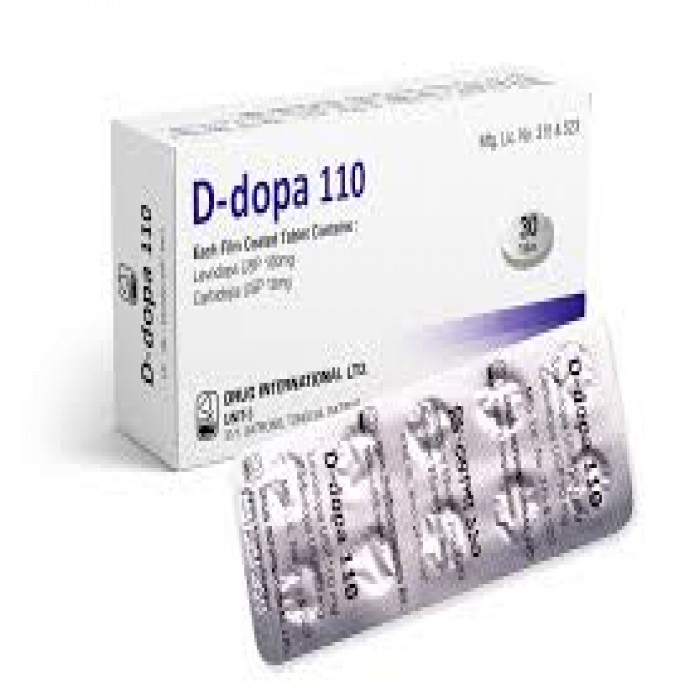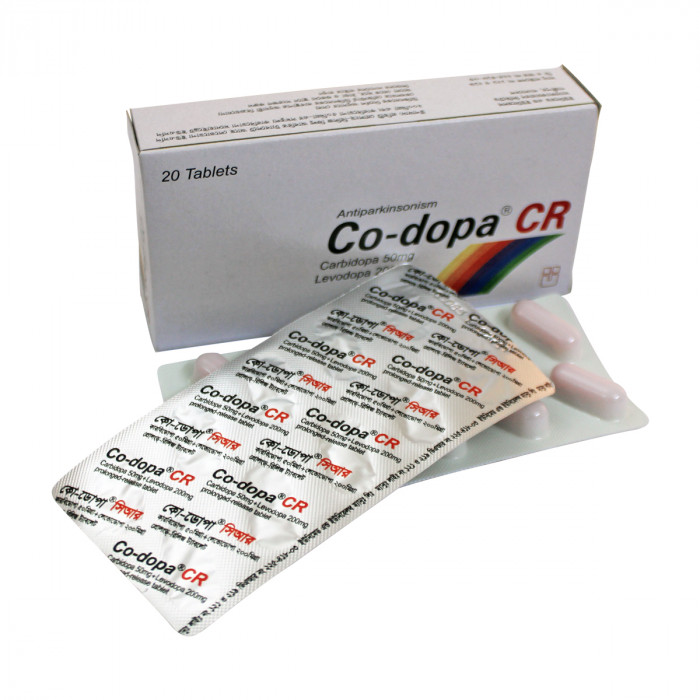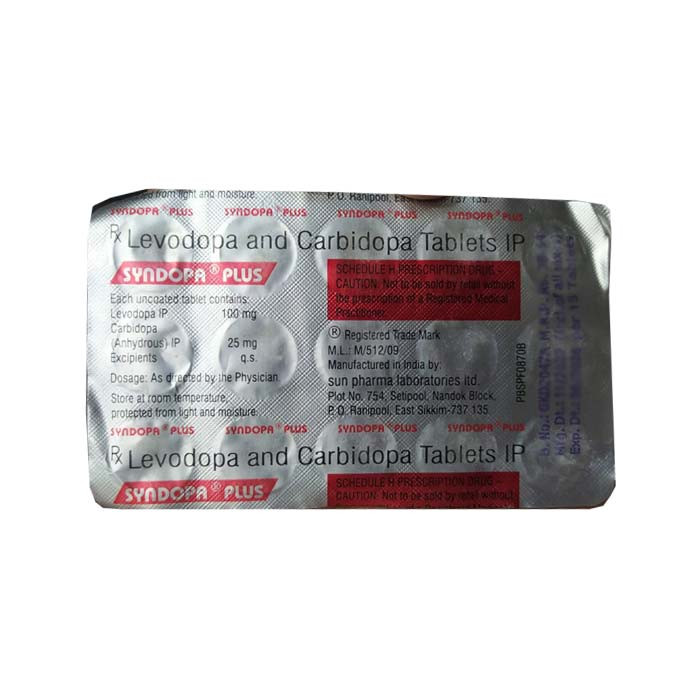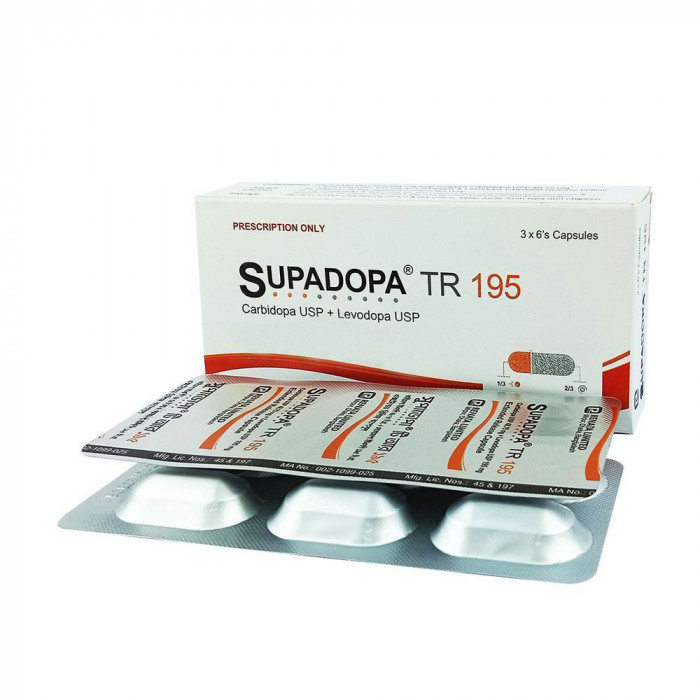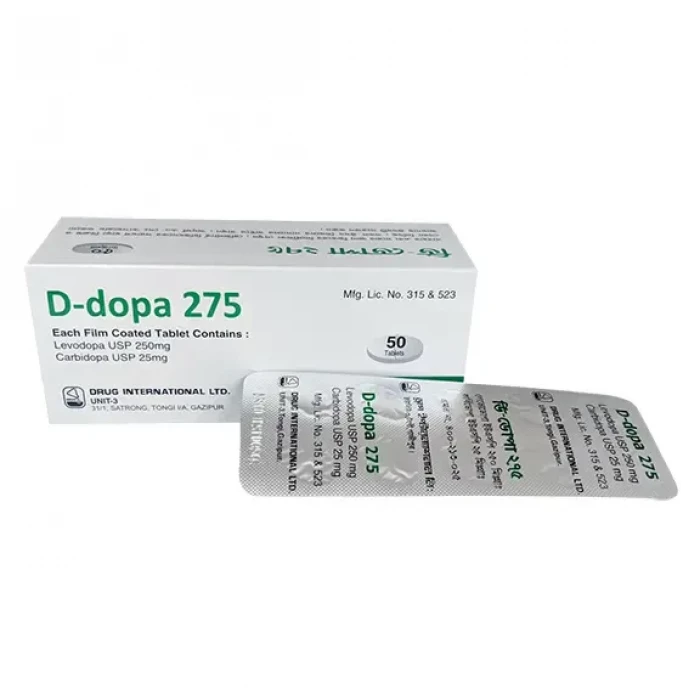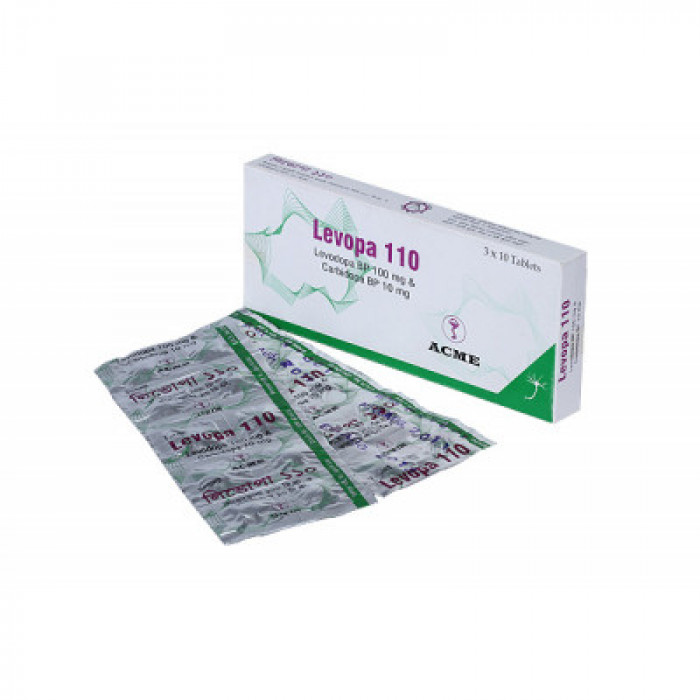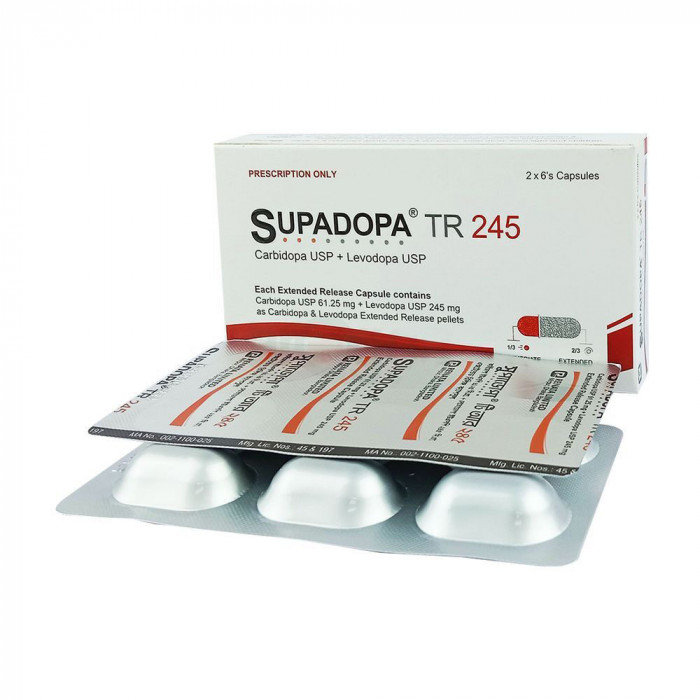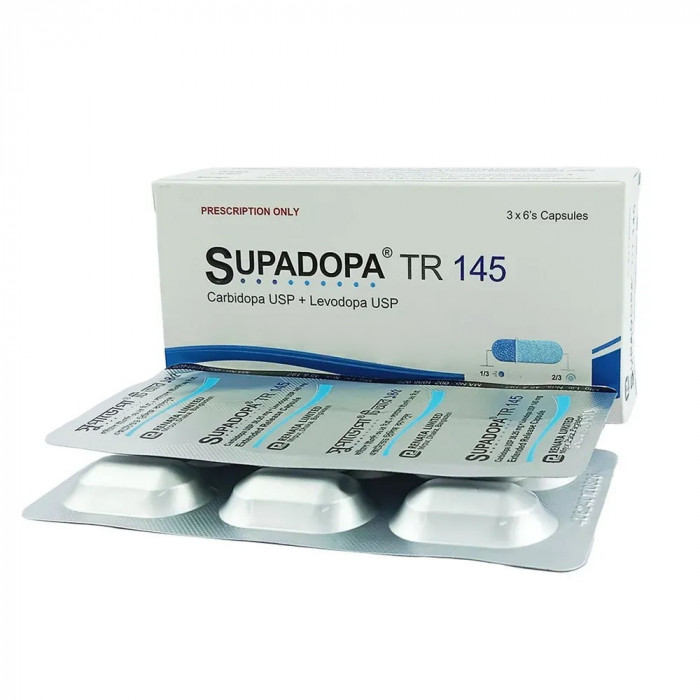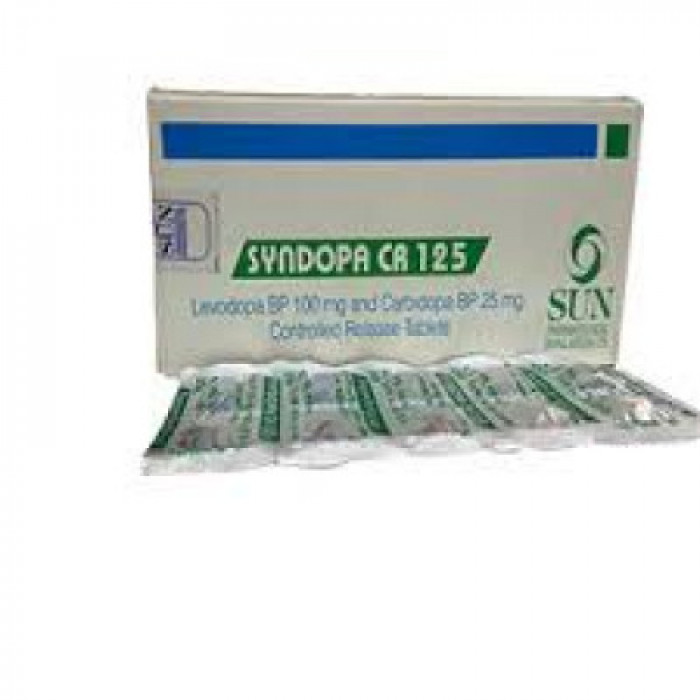
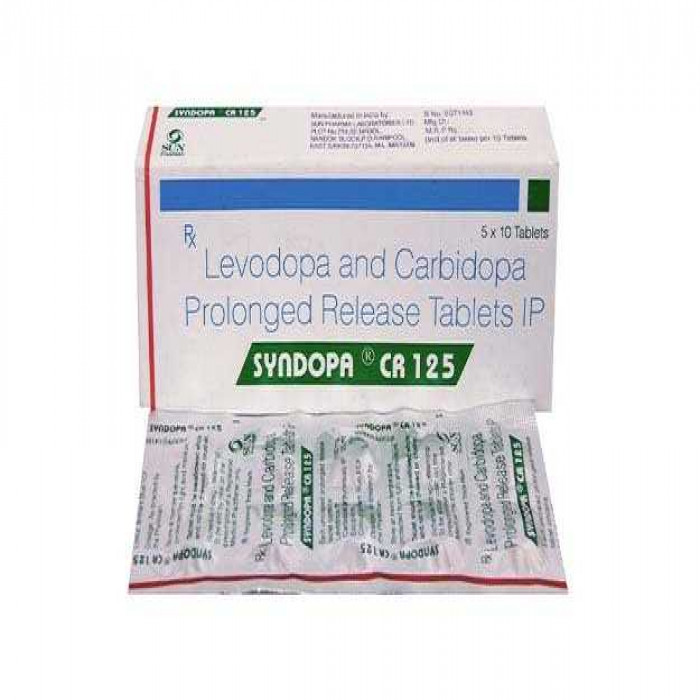

✔ 100% Authentic Product
👁️ Currently Viewing 4460
Syndopa CR 125mg Tablet 10pcs
Syndopa CR 125mg Tablet is a combination medication used to treat Parkinson’s disease, relieving symptoms such as tremors, muscle stiffness, and difficulty in movement. It should be taken consistently at the same time each day, with or without food, but high-protein meals should be avoided. Follow your doctor's prescribed dosage, and do not stop the medication abruptly without medical advice.
Discount
Price: ৳ 95
MRP:
৳
100.3
5%
Off

100% Genuine Products, Guaranteed

Safe & Secure Payments, Always

Fast, Secure & Efficient Delivery

Proper Packaging
 Cash on Delivery - All over Bangladesh
Cash on Delivery - All over Bangladesh Regular Delivery - 12-24 Hours, Dhaka City* Charge Tk.39-59
Regular Delivery - 12-24 Hours, Dhaka City* Charge Tk.39-59 Regular Delivery - 24-48 Hours, Other Cities* Charge Tk.99-110
Regular Delivery - 24-48 Hours, Other Cities* Charge Tk.99-110
 ফ্রি ডেলিভারিঃ - ৯৯৯ টাকা+ অর্ডারে, ঢাকা
শহরে
ফ্রি ডেলিভারিঃ - ৯৯৯ টাকা+ অর্ডারে, ঢাকা
শহরে ফ্রি ডেলিভারিঃ - ২৯৯৯ টাকা+ অর্ডারে, ঢাকার
বাহিরে
ফ্রি ডেলিভারিঃ - ২৯৯৯ টাকা+ অর্ডারে, ঢাকার
বাহিরে
100% Genuine Products, Guaranteed
Safe & Secure Payments, Always
Fast, Secure & Efficient Delivery
Proper Packaging
 Cash on Delivery - All over Bangladesh
Cash on Delivery - All over Bangladesh Regular Delivery - 12-24 Hours, Dhaka City* Charge Tk.39-59
Regular Delivery - 12-24 Hours, Dhaka City* Charge Tk.39-59 Regular Delivery - 24-48 Hours, Other Cities* Charge Tk.99-110
Regular Delivery - 24-48 Hours, Other Cities* Charge Tk.99-110 ফ্রি ডেলিভারিঃ - ৯৯৯ টাকা+ অর্ডারে, ঢাকা
শহরে
ফ্রি ডেলিভারিঃ - ৯৯৯ টাকা+ অর্ডারে, ঢাকা
শহরে ফ্রি ডেলিভারিঃ - ২৯৯৯ টাকা+ অর্ডারে, ঢাকার
বাহিরে
ফ্রি ডেলিভারিঃ - ২৯৯৯ টাকা+ অর্ডারে, ঢাকার
বাহিরে
✅ Description:
Levodopa is the metabolic precursor of dopamine and crosses the blood-brain barrier to be converted to dopamine in the brain. Carbidopa is a dopa decarboxylase (DDC) inhibitor that reduces the peripheral metabolism of levodopa to dopamine, thereby increasing the availability of levodopa in the brain.
Titration Following initiation, doses, and intervals may be adjusted based on therapeutic response. Typical dosing ranges from two to eight tablets per day, divided into doses every 4 to 12 hours. An interval of at least three days between dosage adjustments is recommended.
Maintenance Periodic clinical evaluations are recommended to adjust the dosage regimen. Additional antiparkinson medications like anticholinergics, dopamine agonists, and amantadine can be added.
Safety Advices

Alcohol
UNSAFE
Unsafe to consume with Syndopa CR 125.

Pregnancy
UNSAFE
Potentially unsafe; consult your doctor due to limited human studies but harmful animal study results.

Breastfeeding
CONSULT YOUR DOCTOR
Breastfeeding is probably safe but may cause partial or complete suppression of lactation.

Driving
CAUTION
It may impair ability due to dizziness, drowsiness, or double vision.

Kidney
CONSULT YOUR DOCTOR
No significant dose adjustment is needed but consult your doctor.

Liver
SAFE IF PRESCRIBED
Use with caution; dosage adjustment may be necessary.
✔️ Uses of Syndopa CR 125mg Tablet
- Parkinson's disease
✔️ How does Syndopa CR 125mg Tablet work?
- Levodopa: Converts to dopamine in the brain, improving movement control.
- Carbidopa: Prevents the breakdown of levodopa in the body, ensuring more reaches the brain.
✔️ Side Effects of Syndopa CR 125mg Tablet
Common side effects include dyskinesia, nausea, hallucinations, confusion, dizziness, and dry mouth. Severe side effects can include neuroleptic malignant syndrome, orthostatic hypotension, and cardiac irregularities.
✔️ Quick Suggestions:
- Adhere to the prescribed schedule for consistent medication levels in the body.
- Rise slowly from sitting or lying positions to avoid dizziness or lightheadedness.
- Be cautious with activities requiring alertness, such as driving, due to potential drowsiness.
✔️ Indication of Syndopa CR 125mg Tablet
Levodopa-Carbidopa prolonged-release tablets are indicated for the treatment of idiopathic Parkinson's disease, particularly to reduce "off" periods in patients who have been previously treated with levodopa/decarboxylase inhibitors or with levodopa alone and have experienced motor fluctuations.
✔️ Pharmacology
According to current data, symptoms of Parkinson's disease are linked to dopamine depletion in the corpus striatum. Dopamine's metabolic precursor, levodopa, crosses the blood-brain barrier and is likely converted to dopamine in the brain. Carbidopa prevents peripheral levodopa from being decarboxylated.
Because carbidopa's decarboxylase inhibitory effect is limited to extracerebral tissues, combining it with levodopa increases the amount of levodopa accessible for delivery to the brain.
✔️ Dosage & Administration of Syndopa CR 125mg Tablet
Dosage For patients currently treated with conventional levodopa/decarboxylase inhibitor combinations, the dosage with Levodopa-Carbidopa prolonged-release tablets should initially provide no more than approximately 10% more levodopa per day, with the dosing interval extended by 30 to 50%, ranging from 4 to 12 hours. Dosages up to 30% more levodopa per day may be necessary. Conversion guidelines from conventional to prolonged-release tablets are provided.
Administration Patients currently on levodopa alone should discontinue levodopa at least eight hours before starting the CR tablet. For those with mild to moderate disease not previously treated with levodopa, the initial dose is one CR tablet twice daily, not exceeding 600 mg of levodopa per day.
✔️ Interaction
Caution is needed when administering Levodopa-Carbidopa with antihypertensive agents, antidepressants, anticholinergics, iron supplements, and other drugs that may interact with levodopa or carbidopa.
✔️ Contraindications
Levodopa-Carbidopa prolonged-release tablets are contraindicated in patients with hypersensitivity to any component, narrow-angle glaucoma, and those treated with non-selective monoamine oxidase inhibitors. It is also contraindicated in patients with undiagnosed skin lesions or a history of melanoma.
✔️ Pregnancy & Lactation
There is insufficient data on the use of Levodopa-Carbidopa in pregnancy. It should not be used during pregnancy or lactation.
✔️ Precautions & Warnings
Care is required when administering to patients with severe cardiovascular or pulmonary disease, peptic ulcer history, or convulsions. Levodopa has been associated with sleepiness and sudden sleep onset; patients must be cautious about driving or operating machinery. Behavioral monitoring is recommended due to potential impulse control disorders.
✔️ Storage Conditions:
Store in a cold, dry, and light-protected location.
⚠️Disclaimer:
At ePharma, we’re committed to providing accurate and accessible health information. However, all content is intended for informational purposes only and should not replace medical advice from a qualified physician. Please consult your healthcare provider for personalized guidance. We aim to support, not substitute, the doctor-patient relationship.




